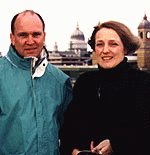Paul Fitzgerald and Elizabeth Gould are a husband and wife team of journalists who have spent the last thirty years keeping a close eye on Afghanistan. They are the go-to folks if you want to really understand this hot spot and its history. Welcome to OpEdNews, Paul and Liz. Your book, Invisible History: Afghanistan's Untold Story, came out last year. Please tell our readers a bit about your background and what made you the right ones for the job.
Big things were happening
in 1978, with new approaches to old problems as the Carter administration vowed
to eliminate the threat of nuclear war and reevaluated detente with the Soviet
Union. The Strategic Arms Limitation Treaty, SALT was a major vehicle for these
changes and by 1979 we had focused on its impact by interviewing the central
figures. By the end of 1979, we had finished a documentary called the Arms Race and the Economy, A Delicate
Balance, analyzing the effects of defense spending on the US economy.
Having experienced a decade of improving relations with the Soviet Union our
documentary was received with great interest.
Then, on December 27, 1979, the Soviet invasion of neighboring Afghanistan rocked the world. Weeks later the government of Afghanistan expelled 1,135 Western journalists, leaving what President Carter had labeled "the greatest threat to peace since the Second World War," cloaked in a veil of darkness. Officially viewed as a long awaited thrust by the Soviet Union toward the Persian Gulf and a dangerous threat to American interests, dialogue with the Soviet Union ceased. Within months, we witnessed not only the dismantling of detente, but a near complete suspension of the cautionary approach to nuclear weapons born of the Cuban missile crisis.
Then, an article in Foreign Policy magazine in 1980 caught
our attention. Titled Victory is Possible
Colin Gray and Keith Payne laid out what was to become the Reagan Doctrine. "If
American nuclear power is to support US foreign policy objectives," they wrote,
"the United States must possess the ability to wage nuclear war rationally."
Since 1945 the U.S. had struggled with the idea of using its nuclear weapons to
fight a war rationally but had come up empty handed. But here were two thinkers
doing just that and justifying it with a medieval concept known as the Just War
Doctrine of the Catholic Church:
"Force can be used in a just cause; with the right intent; with a reasonable chance of success; in order that, if successful its use offers a better future than would have been the case had it not been employed; to a degree proportional to the goals sought, or to the evil combated; and with the determination to spare noncombatants, when there is a reasonable chance of doing so."
Somehow, the Soviet invasion of Afghanistan had thrown American thinking back to the Middle Ages and into the realm of Holy War to justify what all sides had heretofore considered the madness of nuclear war. As we watched the Washington bureaucracy empty of moderate voices, Afghanistan became the rallying cry for an arms buildup that would end public debate about American foreign policy.
But how could the media after Vietnam and Watergate almost en masse take the Afghan story at face value, refusing to question serious omissions that emanated from Washington? That January, we appealed to the Afghan Charge d'Affaires at the United Nations to allow us to bring a TV crew into Kabul to see for ourselves what the Soviets were up to. Six months later, our request for the first visa to enter Afghanistan behind Soviet lines was granted. When CBS News wanted our exclusive story we were on our way.
(Note: You can view every article as one long page if you sign up as an Advocate Member, or higher).






